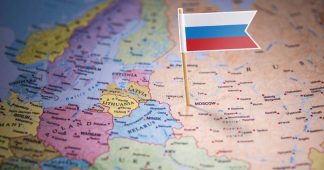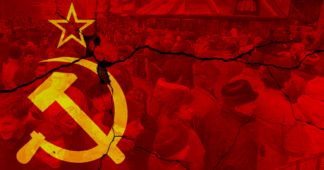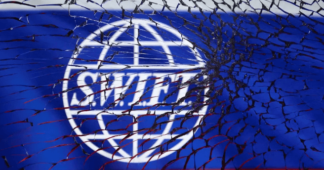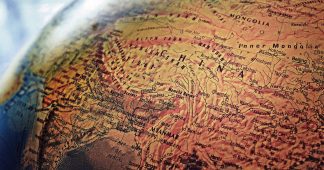Second of two articles. Read Part I here
Second part of the text based on the speech of the author to a debate held in the Valdai Club on June 30th, 2022, with the participation of Oleg Barabanov, Programme Director of the Valdai Club, Konstantin Bogomolov, Director, Artistic Director of the Theatre on Malaya Bronnaya, Andrey Fursenko, Assistant to the President of the Russian Federation and former Minister of Education and Science of the Russian Federation, Dmitri Trenin, Member of the Council on Foreign and Defence Policy and Liu Zhiqin, Senior Research Fellow at the Chonyang Institute for Financial Studies at Renmin University of China (RDCY).
In material terms the Soviet collapse – suicide permitted the globalization. This is a very common but also very confusing and badly defined term. We use it here in the sense of the effort of the big international financial capital to dominate the globe.
Globalization is a cultural phenomenon, but it is not only or mainly that. It is a system of organization of the economic life on Earth by generalization of the capitalist mode of production and distribution. Behind this system of established national and international social relations there is a system of power of the big international Financial Capital, based on a few international institutions like the IMF, using the United States as its world police and armed force, and based to a hidden but quite strict hierarchy of states and nations. Behind the rules there is an Empire. All animals are equal, but some are more equal than others in this system. The use of dollar as world currency and the generalization of western sanctions, that is the selective abolition of the general rules, is the best proof of the existence of a “Dictator” (in the sense Karl Schmitt was defining this term).
In cultural and political terms the soviet collapse was understood and felt worldwide as the end of socialism, the proof that human societies cannot reign on their economic being, they are obliged to follow the will of the modern God, the Capital. An enormous retreat of critical social thought was the result. Even the very notion of progress, which was central in all modern era has been put in doubt, distorted and even, at least partially, reversed.
In this intellectual and political atmosphere, many analysts tend often to reverse completely the relationship between the material and the spiritual sphere and isolate the intellectual from the socioeconomic processes, which is a source of major confusions when we speak about ”traditional” vs. “modern” values, “western” vs. “non western” values, and also the notions of nation and nationalism, democracy and freedom.
On the one hand, globalization has led to an explosion of individualism. Its new model is the individual without any limits, whose value is measured by its wealth, able to realize its desires without any social or moral constraints. It is the international class of Davos.
But the vast majority of people see their world being destroyed without understanding the new – and worse – world in which they are invited to live. They react to this by sticking to their group (national and other identities) or to their traditional and religious values.
The double nature of nationalism
Nationalism as we know it was born in the West as a result of the French revolution and it is a very western phenomenon or value if you prefer. Of course the notion of nation, of ethnos is much older, still its modern meaning is the child of the French Revolution. In history it has been a great weapon of oppressed nations and classes, its force was for example behind the Chinese and the anticolonial revolutions. But it can also become a tool of the ruling classes of the West to subjugate the whole world. In the period opening with the demise of “soviet socialism” although the general ideology of the neoliberal West was the general hostility to any form of nationalism, it made some exceptions, proving its motivations were rather practical than “ideological”.
For the West the Serb or the Russian nationalisms are considered as arch-enemies and the absolute evil. But the Croatian, the Albanian or the Ukrainian nationalisms are blessed as liberation movements, even in spite of their sympathy for Nazi ideas.
To put all the nationalisms, the nationalisms of the oppressed and of the oppressors, in the same basket and to demonize or to idealize them is an enormous mistake with very serious strategic consequences especially now. There is no other field where Lenin’s remark about the “concrete analysis” of a “concrete situation” is more relevant than this one.
The danger of a wrong appreciation of nationalist currents is very acute now because a part of the western ruling elite, understanding the difficulties of dominating through the neoliberal globalization and a world market which seems to favor China instead of the US, as it was planned, it is ready to change the tune, embracing nationalism, in order to fulfill by other means the same goals. But, in the same time, it is impossible for the Left to do effective policies in one country not referring to its national context. The struggle is not really between pro-nationalists and anti-nationalists, as the embourgoised western left, or what it remains of it, seems often to believe. It is between competing visions for one’ s nation.
It was by adopting a specific, reactionary form of nationalism that humanity has gone to Fascism, Nazism and WWII in the ‘30s. Mussolini and Hitler were not just crazy ideologues. They were not defined by their nationalism. Their nationalism was defined by the fact it became the plan B of the ruling German and Italian elites. They were financed by Fiat, by Ericson, by Krupp, by Siemens. The war against western workers inside their countries and the war against the USSR were in their DNA, it was not an accident.
The nationalism of an oppressed nation directed against its oppressors is a very different thing from the nationalism of a power aspiring to world domination.
“America first”, means everybody else, Europe, Russia, China, Latin America etc. have to go to the second, the third or the tenth place. There is no and there can be no such thing as isolationism in the US, because the US is constructed as an Empire of the Capital. This Empire cannot exist without expanding and without trying to rule the world, for its own organic reasons and this is why it cannot accept China, Russia, Iran or even Europe as equal partners. It can only be contained until a more general global civilizational change will take place in the world, the United States and Europe included.
The contradictory nature of the so-called “western values”
Here we see the double character of nearly all so-called western values and ideologies. They were born in the West, because the West dominated the world for five centuries. The West claims them, but it more often betrays them. There is a trap in classifying too easily the values themselves as western or eastern. China is now the top paradigm of the Asian success. But its central ideology, Socialism and Marxism, are a product of the West, not of the East!
Democracy
We find the same contradictions regarding the notion of democracy. I am a Greek, so I don’t need to think in order to grasp its meaning. Kratos means the state, Dimos means the people and Democracy the power of the people. There are probably some elements of democracy here or there, but for most part democracy remains an ideal to be fulfilled. The real measure of democracy is not the application of certain parliamentarian forms. It is the degree to which people can influence the decisions, the degree a given regime takes into account the popular needs and desires.
If you say to an American or European citizen that he is the master of his state he will take it as a joke. In France one of the main demands of the Yellow Vests revolt, supported by the crashing majority of the people, was the demand to control the executive and legislative power by referenda. The famous slogan of the French Revolution was Egalite, Liberte, Fraternite but you cannot separate and much more counterpose the three terms, everyone of them is the condition for the realization of the others. By the way democracy is incompatible with unipolarity, because unipolarity implies a racist hierarchisation of states, nations and civilizations.
By using democratic slogans to justify imperialist interventions the West has done an enormous damage to the ideas of democracy and human freedom and rights. But is this a reason to denounce them?
I am very disappointed when I read Russian or Chinese or Southern writers criticizing the West for intervening to bring democracy. It has never done so and it will never do it. You know that very well out of your own experience. The United States has supported the dissolution by bombing of the Russian parliament in October 1993, not in order to impose the power of the people, but in order to help the Oligarchs take power over the people.
I think it is a grave, strategic error to recognize to Western imperialism any democratic credentials or goals.
Many people believe also – and a few say it openly – that democracy (which, I repeat, we do not have to identify with parliamentarian forms of government) is a wrong goal in itself, that societies will never be able to rule themselves and if they do they will be unable to confront the difficult problems. I would agree that attaining democracy and making it work seems much more difficult than relying on a centralized system and some times one has to rely on such a system. Still, in the long run, a really democratic system based on intelligence distributed and diffused to all society, inclusive of all strata of the population, based to a large degree of justice and equality, is much more stable than an overcentralized system, as Tocqueville already remarked, if of course freedom is accompanied by responsibility, the fundamental point of Fromm in his classic Escape from Freedom. Soviet history provides us with some edifying examples, as the experience of 1941 and 1991, of the catastrophes a seemingly very strong, overcentralized all-powerful state can lead.
Traditional values
In conditions of collapse of the idea of socialism, the biggest collective hope humanity has produced in modern times and in conditions of the massive social, economic, geopolitical and cultural shocks, which followed the soviet collapse, it is only normal that we witness, in the last 30 years a massive turn to traditional pre-modern values and ideologies in all regions of the world.
People feel they don’t have any impact or control on their lives, they don’t understand a changing world dominated by the religion of Money and by the cult of an Individual without limits, without any social, national, religious or ideological identity. The cultural transformation of globalization is destroying one of the most fundamental human needs, our need to belong to larger entities, which protect us and provide with meaning our short and limited existence.
By the way, modern ideologies, like the Enlightenment, the Socialism, Women’s Equality, Self-Management or Ecology, are not in reality in so categorical opposition to the great religions developed in the past as many people believe. Both traditional and modern ideological systems share one property. They represent the expectation of a just and dignified life and they are interested to the social fabric, not in promoting individualism. In that sense they are both opposed to the ideology and the values of late Capitalism.
Traditional values and ideological systems can help nations resist the various economic, military or cultural aggressions and shocks they suffer. But they are not sufficient for a decisive victory over the forces of Evil still working humans and their societies.
Let us take an extreme, and for this reason useful example. In order to resist an all-powerful invader and to exist as a nation, the Afghan people had to resort to the most retrograde forms of Islamic tradition. This has helped them to resist, but it is hardly of any help in addressing their problems now.
A new global vision is necessary
We cannot get the clock of History back, we have to invent a new path addressing the old, but also the new problems and existential threats Humanity is facing. The productive forces Humans have developed since 1945 permit, for the first time in History, to satisfy the reasonable needs of probably twice the global population of today. But it is impossible to do it in the context of capitalist relations of distribution. Under the circumstances the “development of the productive forces” they way it is done is undermining – in the short time – the very conditions for survival of the humans, through climatic change and other forms of damage to the environment. We are crossing the limits of the planet. We have weapons, which, if used to dominate the globe – or launched by accident – will destroy the world to be dominated!
The power/powers, which will be able to produce and adopt such a global vision, will profit a lot from it. I read recently a very interesting novel by Yulian Semyonov, and I think it is Yuri Andropov who speaks behind him. He attributed the Soviet victory on Nazi Germany to the fact Soviets were not defending only the interests of one nation, like Germans did, but also the interests of all dispossessed and oppressed people in the globe. Millions of people around the globe were ready to satisfy their lives for the Soviet Union because they believed it represented a big hope for all humanity.
According to Emmanuel Wallerstein, the basic justification of every policy of the West is the ideology of ecumenism the West is projecting full of complacency and arrogance. But it is a false ecumenism, as it corresponds only to the narrow interests of the western ruling classes, not to the interests of humanity. To fight against western ecumenism traditional values can be useful but are rarely sufficient. A new, real ecumenism must be developed against western pseudo ecumenism, respecting certainly the particularities of every nation. We need a new vision for the future of humanity, which will correspond to the basic interests of the greatest majority of the human beings and it will answer the new challenges and even existential threats our species is facing now, for the first time in its history.
We need to “divide” the world in order to resist unipolarity. But we need also to “unite” it in order to make multipolarity possible and provide it with content.
Thirty years ago the main problem humanity was facing was to resist “unipolarity”, that is the rising totalitarian power of the financial capital and of its main tool, the United States of America. By now it has become clear the West has not the power to dominate mankind. Still it has the power to destroy all of us in its quest for domination. Since 1945, humanity has developed means of production and of destruction which can, both, lead to the end of human life. It is not enough to stop the drive of the Western elites to global domination, because they will still have the capacity to take all of us down to the hell with them, pursuing the unattainable goal of world domination. This is making more than ever imperative the emergence of a new global vision, corresponding to the great needs of humanity now and able to mobilize people in the North and in the South, in the West and in the East, in order for the human civilization and, indeed, for the human species to survive. To build it we need to throw to the rubbish the part of so-called “western values”, which is representing anti-human, anti-social and imperialist tendencies and keep what is worthy for all humanity.











